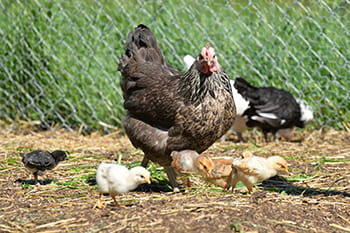Sudden death of large numbers of birds is not uncommon with HPAI. Owners are legally responsible for notifying the Canadian Food Inspection Agency (CFIA) of reportable and notifiable bird diseases such as avian influenza. Producers should monitor their birds daily and report any unusual signs or symptoms. Symptoms of avian influenza can include:
- Sudden death of birds;
- Lack of energy and appetite;
- Decreased egg production;
- Swelling around the head, neck and eyes;
- Coughing, sneezing, or gasping for air; and
- Tremors or lack of co-ordination.
It is always better to be overcautious – report any suspected ill birds to your flock veterinarian and contact the local CFIA office if avian influenza is suspected. Early reporting can greatly limit the spread and impact of disease. There are resources available of what to do if a producer thinks their animals may be infected.
Although rare, avian influenza can also infect humans. Affected people tend to be those who have close contact with infected birds, such as poultry producers, or heavily contaminated environments. Signs in humans are similar to other forms of influenza. For more information on avian influenza in people, see What to Know About Avian Influenza from the Saskatchewan Ministry of Health.
Small flock poultry are at an increased risk of contracting HPAI and other infectious diseases. This is because poultry with access to the outdoors can have direct contact with wild birds or contaminated environments. The Ministry of Agriculture provides testing support to small flock producers through our Saskatchewan Small Flock Poultry Surveillance Program.

